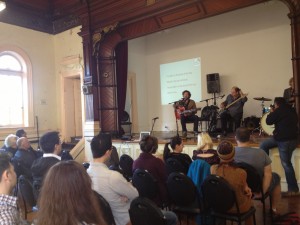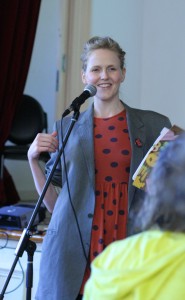I’m greeted at the door by a friendly middle-aged man handing out flyers. We make brief eye contact before I walk into the old school hall where it’s cool and dark. Inside, a handful of people sit waiting for the proceedings to begin. In the courtyard outside, people lurk in strands of sunshine looking at their phones. I pop into a nearby café to grab a coffee to take the edge off this early Sunday morning on this side of the Yarra.
Back in the hall, seats are filling up. Before long, our spritely, young service leader is welcoming us all to this new congregation, letting us know what to expect of the next 60 minutes and calling us to savour the day. Soon after, there’s a reading and we sing a song about believing. Later on someone gives a moving testimony, before we’re called to wonder and awe, followed by a moment of reflection. Then it’s more songs, cake and a collection. Yes, this feels like church.
There’s just one thing missing: God.
 The Sunday Assembly, a self-proclaimed “godless congregation” aiming to “celebrate the wonder of life” was held for the first time in Melbourne on the weekend. Around 60 people gathered in the South Melbourne Commons, part of an old Catholic church precinct which has been leased to the Friends of the Earth by larrikin Priest, Father Bob Maguire.
The Sunday Assembly, a self-proclaimed “godless congregation” aiming to “celebrate the wonder of life” was held for the first time in Melbourne on the weekend. Around 60 people gathered in the South Melbourne Commons, part of an old Catholic church precinct which has been leased to the Friends of the Earth by larrikin Priest, Father Bob Maguire.
The idea of the Sunday Assembly came about when two UK comedians (Pippa Evans and Sanderson Jones) decided to bring their church upbringing and atheist leanings together to provide a community for like-minded people. Currently in Australia for the Melbourne Comedy Festival, Pippa decided to run a local gathering.
A former church youth group attendee, Pippa told the gathering she stopped believing in God at the age of 17. “It was just like a phase in my life, like Santa or the tooth fairy.”
But there was something missing when she gave up her faith: “When I stopped believing in God, it wasn’t God I missed, but church, the community. I couldn’t find an equivalent that didn’t involve partying or joining what felt like a cult.” She missed having a place to belong. And it turns out, her friends were looking for something similar.
“I spoke to my friends and they too were actively jealous of their friends who had a religion because they had an automatic friendship group and support network,” she told the crowd.
And so the Sunday Assembly was born. It follows a very similar format to church: song-reading-testimony-talk-song-collection-morning tea. The missing elements (aside from the Bible, God and the gospel) are prayer and communion, although they substitute prayer for a moment’s reflection.
The group’s penchant for religious ritual goes to show you can’t make generalisations about people, whether you’re talking about Christians or atheists.
The bunch behind the Sunday Assembly seem to be the “always look on the bright side of life” variety of atheist- they’re much more likely to call people to find joy and hope in life without God, than to directly criticise Christianity. It’s a disarming approach, and as a Christian, there were very few moments of squirming in my seat during the service; I genuinely had a good time. There were rollicking tunes, a heart-warming story of a guy who’s lived through cancer twice and an interesting talk on the value of philosophy. It did inspire and as promised, provided a “foot-stomping” Sunday morning. Of course, it’s not for all atheists. My atheist brother thought it sounded like a “dumb idea”.
But it also left me wanting more, because at the end of the day, the message of the morning—“when life gives you lemons, make lemonade”— is essentially cold comfort. This particular brand of atheism says we don’t need God to have a good time and make the most of life.
It’s an upbeat-sounding message, but one with an empty centre.
Where do you turn when you’re drowning under life’s big waves? Our friends, says Pippa. But our friends, while a great support, are prone to letting us down, and ultimately, they can’t save us from the realities of life (ie. death and evil) which haunt us all.
Similarly, the problem of the need for relationship which the Sunday Assembly is trying to solve has its root in a greater reality – ultimate relationship with our Creator. There is no earthly relationship which can replicate the security, goodness and beauty of union with Christ.
Another place where The Sunday Assembly promises much is on the question of the purpose of life. One of the speakers said through philosophy, we can pursue what is true, good and beautiful. It’s is a noble aim, but without engaging the God whose very essence is those things, what one finds along the way will always be the breadcrumbs, not the loaf itself. Like a “godless congregation”, a life searching for truth, goodness and beauty without God will always be a distortion.
C.S. Lewis wrote in Mere Christianity about this tendency humans have to unknowingly chase after the divine:
“Most people, if they have really learned to look into their own hearts, would know that they do want, and want acutely, something that cannot be had in this world. There are all sorts of things in this world that offer to give it to you, but they never quite keep their promise.”
 Rhys Bezzant, a lecturer in theology at Ridley Melbourne, and author of books on the theology of church says it’s not surprising a group like this would arise.
Rhys Bezzant, a lecturer in theology at Ridley Melbourne, and author of books on the theology of church says it’s not surprising a group like this would arise.
“It is an old Augustinian idea that human beings are made to love, so our passions need to be bent, or channelled, or structured so that our longings have an outlet and a shape.”
The Sunday Assembly is providing that outlet, but, he says, by nature, it won’t satisfy.
“I say, good on them for wanting more than a shopping mall or a football game can provide. I just don’t know how deep the well is that they want to drink from. Only Jesus can quench our thirst forever.”
Ultimately, it is the church where the body of Christ will be found, which is the distinction between a Christian gathering and the Sunday Assembly. The Christian church is a local expression of the body of Christ, not just a bunch of people with similar ideas.
“In the end,” says Bezzant, “the church isn’t merely a community for encouragement, but the bride of Christ, a fellowship which has been connected into the life of God forever. We are not merely an inspiring part of this world, but the beginning of the next one.”
It will be interesting to see how the group develops and whether it provides the inspiration, friendship and community its members are looking for.
The next meeting of the Sunday Assembly is happening on June 23 at the South Melbourne Commons.
Email This Story
Why not send this to a friend?





